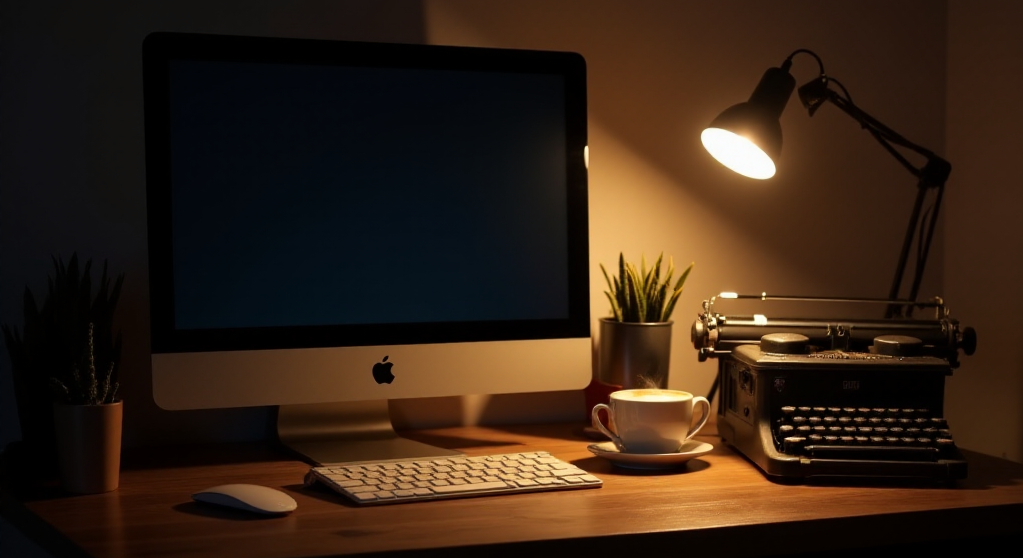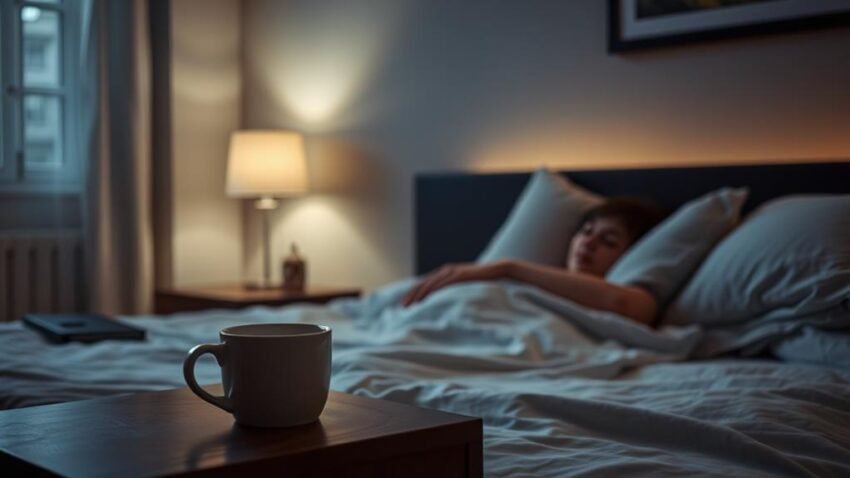As I lay awake, the dim moonlight casting a silver glow on my bedside table, I can't help but think about the cup of coffee I had earlier that day. Its invigorating aroma still lingers in my memory, but now it's a reminder of the long night ahead. Caffeine's lingering effects can disrupt even the best of sleep routines. To combat this, establishing a strategic coffee cut-off time and incorporating relaxation techniques are essential steps. Curious about how to sail smoothly from alertness to restful sleep? Let's explore practical strategies that can help you navigate this common challenge.
Caffeine's Impact on Sleep
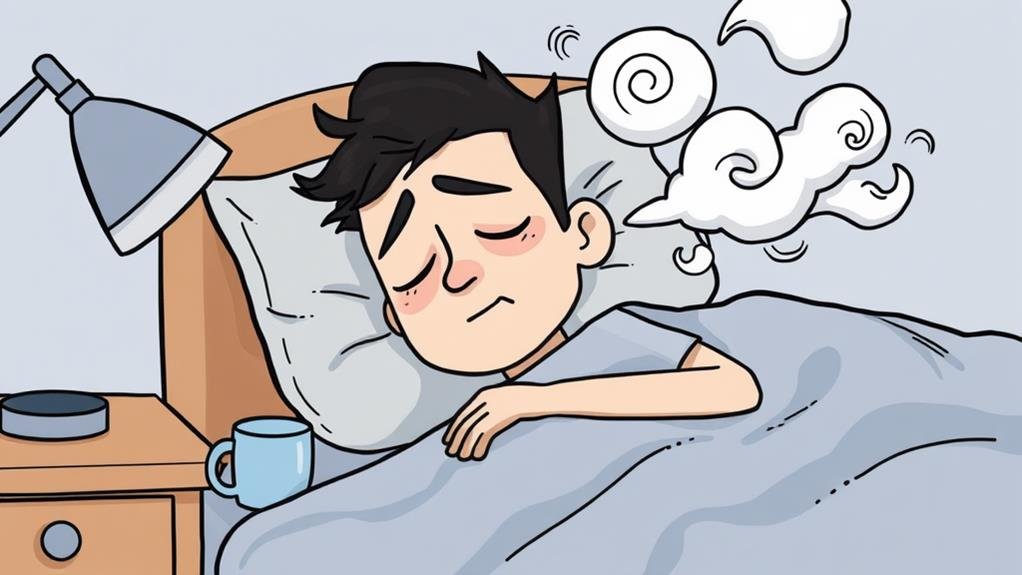
Consuming coffee, especially in the hours leading up to bedtime, can greatly influence your sleep quality. Caffeine, the main active component in coffee, delays falling asleep and reduces total sleep hours. This can significantly impact how well you feel rested and refreshed in the morning.
When you drink coffee close to your bedtime, it disrupts deep, slow-wave sleep. This type of sleep is essential for feeling refreshed and rejuvenated. Caffeine blocks adenosine receptors in the brain, which hinders the natural process of falling asleep. Adenosine is a chemical that promotes sleep; caffeine inhibits it, leading to alertness instead of relaxation.
Even if you manage to fall asleep after having coffee, the quality of your deep, restorative sleep may still be compromised. This means that while you might get some hours of sleep, you won't feel as rested as you would without caffeine's interference. To help your body prepare for a good night's sleep after having coffee, it's important to understand these effects and plan your coffee consumption accordingly. Knowing how caffeine impacts your sleep can make a significant difference in helping you fall asleep and feel rested in the morning.
Hydration and Coffee Consumption
When you drink coffee, it's important to remember that it acts as a diuretic, which can lead to dehydration. This dehydration can cause tiredness, thirst, and dry mouth—symptoms that might seem counterintuitive given coffee's stimulating effects. To combat this dehydrating effect, it's essential to consume water alongside your coffee. Regular maintenance of hydration is vital for peak body function, similar to how regular descaling maintains coffee machine performance.
Drinking water helps maintain hydration levels and reduces the fatigue caused by caffeine intake. Alternating cups of coffee with glasses of water can also reduce overall coffee consumption and mitigate its dehydrating effects. Staying hydrated is crucial for maintaining energy levels and improving sleep quality after consuming caffeine.
Proper hydration guarantees that your body functions at its best, allowing you to stay alert without succumbing to the negative side effects of caffeine. Engaging in physical activity and drinking herbal tea can also help flush out excess caffeine from your system, further combating dehydration-induced fatigue. By prioritizing hydration alongside your coffee consumption, you can better manage the potential dehydrating effects of caffeine and maintain a healthier balance in your daily routine. This proactive approach will help you stay hydrated and optimize that your coffee intake does not negatively impact your sleep or overall well-being.
Coffee Cut-Off Time
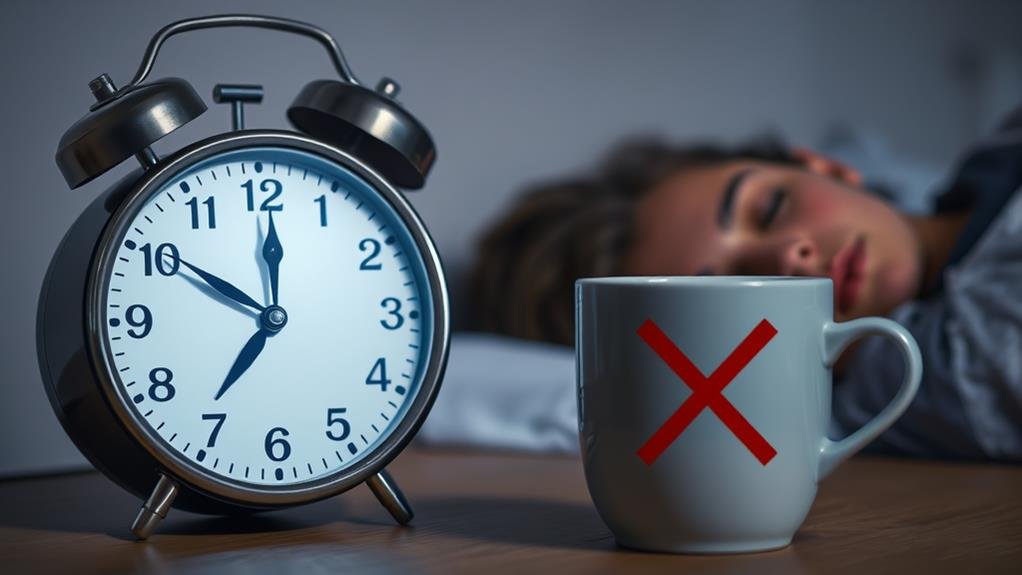
To guarantee a restful night's sleep, it's important to establish a coffee cut-off time. This means setting a specific time of day after which you no longer consume coffee or any other caffeinated beverages. Ideally, this cut-off should be at least 8 hours before bedtime to minimize caffeine's disruptive effects on your sleep. Different methods of coffee preparation, such as oven roasting, can influence the caffeine content and flavor profile, which may impact your overall caffeine consumption. Having coffee too close to bedtime can interfere with falling asleep and reduce sleep quality. Caffeine is a powerful stimulant that can affect your ability to fall into deep, restful sleep. By adhering to a coffee cut-off time, you allow your body the time it needs to metabolize caffeine, promoting better rest.
Consistently following this rule helps regulate your sleep patterns and can improve overall sleep quality. Your body's caffeine tolerance might vary, but setting this boundary supports a more restful and rejuvenating night's sleep. It also helps maintain a balanced sleep-wake cycle, ensuring that caffeine doesn't negatively affect your sleep-wake cycle. By avoiding caffeine intake in the evening, you can notably enhance the quality of your sleep and wake up feeling refreshed and ready for the day ahead. This simple habit can make a substantial difference in achieving better sleep each night.
Relaxation Techniques Before Bed
To prepare for a restful night's sleep after having coffee, I find that incorporating relaxation techniques before bed can be incredibly helpful. Listening to calming music or podcasts can help my mind unwind and reduce stress levels. Additionally, using aromatherapy with essential oils like lavender and ensuring I'm well-hydrated before bed can further enhance my ability to relax and fall asleep more easily.
Calming Music
Listening to calming music before bed can be a game-changer for those struggling to sleep after having coffee. It helps lower stress levels and promote relaxation, making it easier to unwind after a caffeine boost.
Benefits of Calming Music
| Benefit | Effect | Outcome |
|---|---|---|
| Lower Stress Levels | Reduces anxiety and tension | More relaxed state |
| Promote Relaxation | Calms the mind and body | Improved mood |
| Slow Heart Rate | Decreases heart rate | Induces tranquility |
| Improve Sleep Quality | Enhances sleep duration and depth | Better rest |
Calming music can also reduce cortisol levels, which are often elevated by caffeine consumption. This leads to a more peaceful and restful state before sleep. Incorporating calming music into your bedtime routine signals your body to unwind and prepare for rest. By adding this simple step, you can significantly enhance your ability to fall asleep despite having coffee earlier in the day.
Aromatherapy Techniques
Aromatherapy methods are a powerful tool for creating a sleep-conducive environment, especially after consuming coffee. Essential oils, like lavender, play an essential role in this process. When used correctly, these oils can help induce relaxation and lower stress levels, making it easier to wind down before bedtime.
Incorporating aromatherapy into your bedtime routine can greatly aid in muscle relaxation and stress relief. Lavender essential oil is particularly recognized for its soothing properties and can be used in diffusers or applied topically. By creating a calming atmosphere with these oils, you can signal to your body that it's time to relax.
Using aromatherapy methods is relatively straightforward. Simply add a few drops of lavender oil to a diffuser or apply it gently to your skin before bed. This natural approach can help counteract the stimulating effects of coffee by promoting a sense of calm and tranquility. By doing so, you can improve your sleep quality and wake up feeling refreshed and rejuvenated. Aromatherapy offers a natural and effective way to relax your mind and body, making it easier to fall asleep even after having coffee.
Hydration Before Bed
When it comes to preparing for a restful night's sleep after having coffee, staying hydrated is vital. Caffeinated beverages can dehydrate the body, which can lead to sleep disturbances. Drinking water before bed helps counteract this effect and promotes better sleep quality.
Making sure you are adequately hydrated before bed can create a more conducive environment for falling asleep after having coffee. Here are some reasons why hydration is important:
- Helps Calm the Nervous System: Proper hydration can soothe the nervous system, preparing your body for sleep.
- Muscle Relaxation: Hydration aids in muscle relaxation and stress relief, contributing to a more restful night's sleep.
- Prevents Dehydration-Induced Disturbances: Drinking plenty of water before bed prevents dehydration-induced sleep disturbances.
- Enhances Overall Sleep Quality: Hydrating before bed can enhance overall sleep quality by maintaining fluid balance in the body.
- Readies the Body: Proper hydration helps ready the body for sleep, even after consuming caffeinated beverages.
According to the Library of Medicine, maintaining good hydration is essential to overall health and well-being, including improved sleep. By making hydration before bed a habit, you can stay hydrated and enhance your ability to fall asleep after drinking coffee. So, remember to drink plenty of water throughout the day and before bedtime to help relax and guarantee a good night's sleep.
Creating a Sleep-Conducive Environment
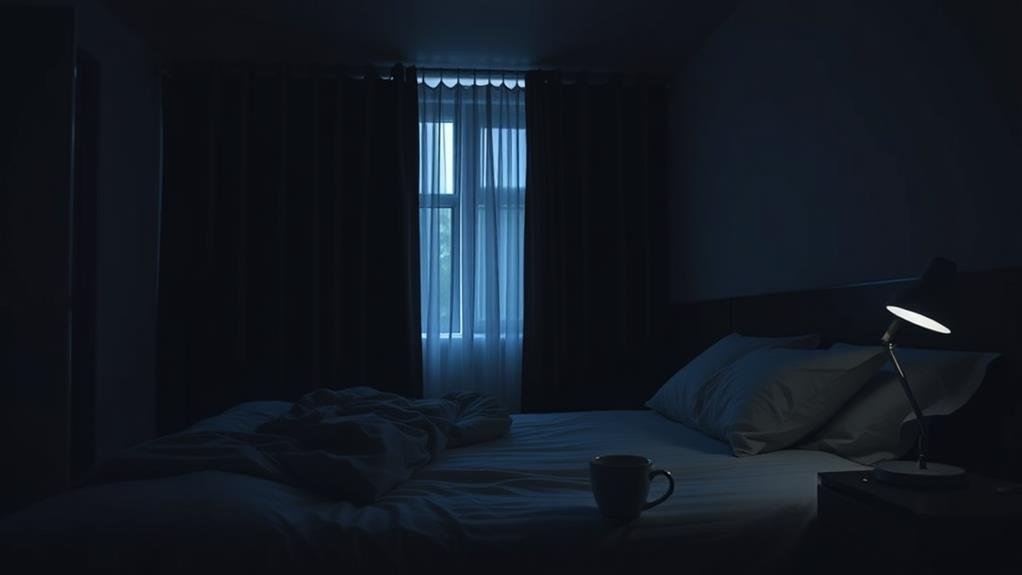
To create a sleep-friendly environment, I prioritize ideal room temperature, light control, and noise management. Adjusting the room temperature to a cool 60-67°F helps me sleep better. Using blackout curtains or eye masks and white noise machines or earplugs also notably enhance my sleep quality by blocking out light and masking disruptive sounds.
Optimal Room Temperature
Setting the most suitable room temperature is crucial for creating a sleep-conducive environment, especially after having coffee. When it comes to ideal sleep, maintaining the right temperature can make a significant difference. Here's why:
- Promotes Relaxation: The perfect room temperature for ideal sleep ranges between 19-21°C (66-70°F), which helps in promoting relaxation.
- Lowers Core Body Temperature: A cool room temperature can help lower your core body temperature, which is necessary for better sleep quality.
- Regulates Melatonin: Cooler temperatures signal your body to produce melatonin, a hormone that regulates sleep-wake cycles.
- Prevents Disruptions: Avoiding extreme temperatures can prevent disruptions in sleep patterns and promote restful slumber.
- Enhances Overall Sleep Quality: Creating a comfortable sleep environment with the right temperature can enhance overall sleep quality, even after consuming coffee.
Light Control and Noise
After optimizing your room temperature, the next crucial step in creating a sleep-friendly environment is managing light and noise. Controlling light levels is important because exposure to bright light, especially blue light from screens, suppresses melatonin production, making it harder to fall asleep. Dimming lights signals your body to prepare for sleep by increasing melatonin production. This simple adjustment can greatly enhance your ability to fall asleep after having coffee.
Noise levels also play a vital role in maintaining a peaceful sleeping environment. Disruptive sounds can keep you awake, making it difficult to relax after consuming caffeine. Using white noise machines or fans can effectively mask these sounds, creating a more tranquil atmosphere that promotes better sleep. By ensuring minimal light and noise, you can create an environment that aids in falling asleep faster even when you've had coffee. Effective light control and noise management are key components of a sleep-friendly environment that helps regulate your body's natural sleep-wake cycle, leading to improved sleep quality.
Physical Activity for Better Sleep
Engaging in physical activity before bed can be a game-changer for improving sleep quality, especially if you've had coffee earlier in the day. While it might seem counterintuitive to exercise close to bedtime, light exercise can actually help your body and mind relax.
When you engage in physical activity, your body releases endorphins, which can induce relaxation and reduce stress levels. This is particularly beneficial if caffeine from your coffee is still affecting you. Here are some ways physical activity can help:
- Enhance Sleep Quality: Exercise during the day promotes deeper and more restful sleep at night.
- Regulate Sleep Cycle: Incorporating physical activity into your daily routine helps regulate your sleep-wake cycle.
- Reduce Stress: Physical activity releases endorphins that can reduce stress levels.
- Relax Muscles: Stretching before bedtime relaxes muscles and prepares the body for sleep.
- Tire the Body: Light exercise before bed can tire the body, making it easier to fall asleep.
Supplements to Aid Sleep
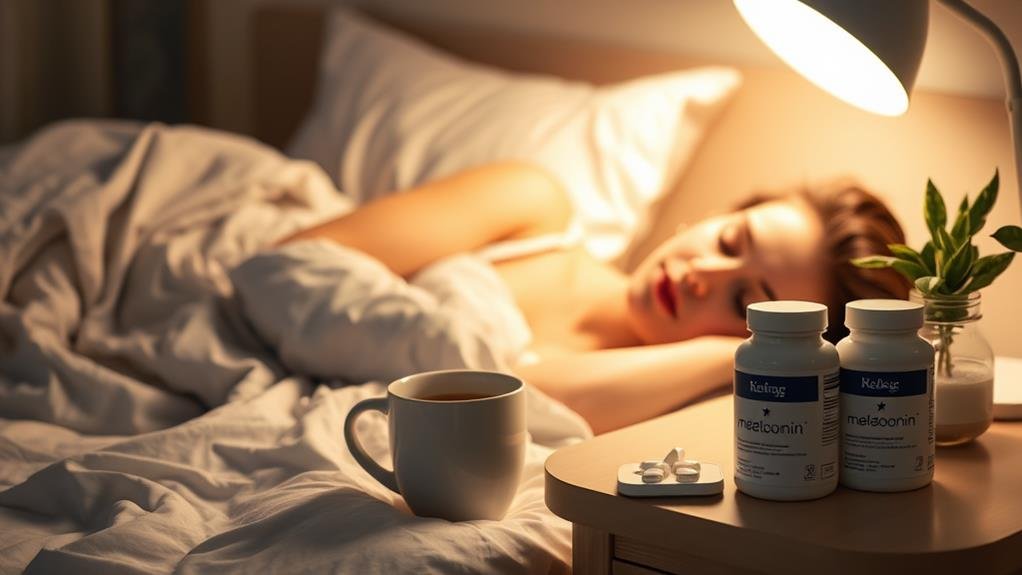
If you're struggling to sleep after having coffee, have you considered adding supplements to your routine? Several supplements can help regulate your sleep-wake cycles and promote relaxation.
Melatonin supplements, for instance, are well-known for their ability to regulate sleep-wake cycles and promote better sleep. Magnesium supplements can aid in muscle relaxation, which is essential for a restful night's sleep. Herbal supplements like chamomile have calming effects that support better sleep quality. Valerian root supplements are renowned for their sedative properties that can help you fall asleep faster. Lastly, L-theanine supplements can reduce anxiety and promote relaxation, making it easier to drift off.
Here's a summary of these supplements:
| Supplement | Benefits | How It Works |
|---|---|---|
| Melatonin | Regulates sleep-wake cycles | Mimics the body's natural melatonin production |
| Magnesium | Aids in muscle relaxation | Reduces muscle tension and promotes calmness |
| Chamomile | Calms and supports better sleep | Acts as a natural relaxant |
| Valerian Root | Promotes falling asleep | Has sedative properties |
| L-theanine | Reduces anxiety, promotes relaxation | Enhances the feeling of calmness |
These supplements can be a helpful addition to your bedtime routine, especially if you're having trouble sleeping after consuming coffee. Always consult with a healthcare professional before starting any new supplement regimen.
Avoiding Screens and Stimulants
While supplements can greatly assist in regulating your sleep-wake cycles, there's another important aspect to keep in mind when trying to sleep after having coffee: avoiding screens and stimulants. The blue light emitted from screens can disrupt melatonin production, making it harder to fall asleep. Additionally, stimulants like nicotine and caffeine can further delay the body's ability to relax.
To promote better sleep, it's essential to steer clear of these potential sleep disruptors. Here are some key points to contemplate:
- Avoid blue light: Refrain from using electronic devices at least an hour before bedtime.
- Limit stimulants: Avoid consuming nicotine, caffeine, and other stimulants close to bedtime.
- Engage in relaxing activities: Opt for screen-free activities like reading or meditating to help you relax.
- Avoid stimulating content: Steer clear of intense conversations or content that could raise your arousal levels.
- Create a bedtime routine: Establish a calming pre-sleep routine without screens or stimulants to signal to your body that it's time to wind down.
Practical Steps for Post-Caffeine Sleep
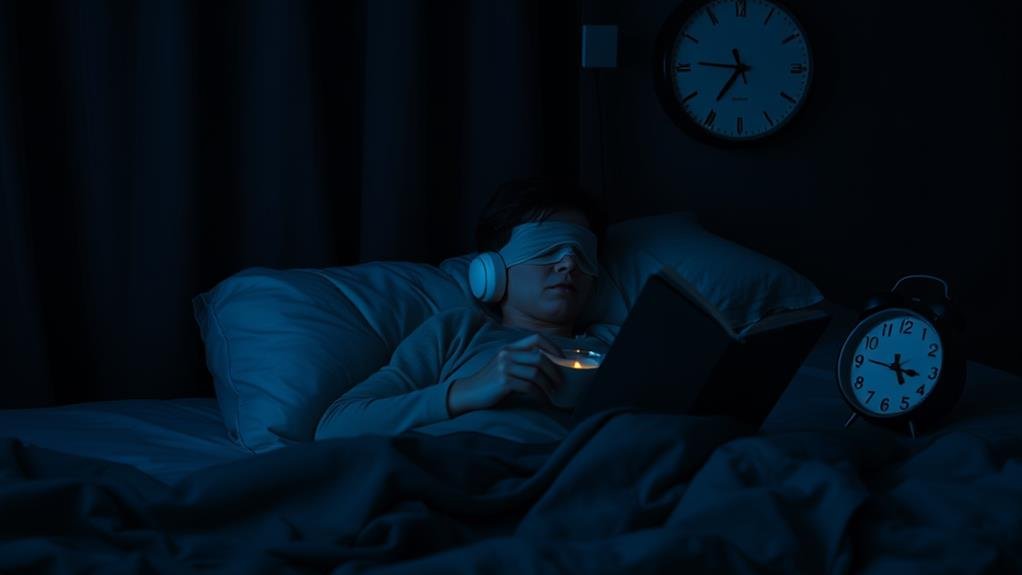
When you've had coffee and need to sleep, taking practical steps can make a significant difference. The effects of caffeine can linger, making it challenging to fall asleep after drinking coffee. To help you sleep better, start by limiting your caffeine intake to one cup of coffee per day. This reduces the caffeine kick and how long it takes for its effects to wear off.
Staying hydrated is essential as water helps flush out caffeine from your system, reducing its impact on your sleep. After consuming coffee, practice deep breathing exercises to calm your nervous system; this can help you relax and fall into a deep sleep more easily.
Incorporating relaxation techniques like Sophrology into your evening routine can also improve your sleep quality. Visualizing peaceful environments before bed promotes relaxation and aids in falling asleep after having coffee. By following these steps, you can mitigate the effects of caffeine and guarantee a restful night's sleep even when you've had coffee earlier in the day. These practices will help you shift smoothly from the alertness caused by caffeine to a state of calmness necessary for quality rest.
Conclusion
To sleep well after having coffee, it's important to understand and manage caffeine's effects. Research shows that caffeine can interfere with sleep for up to 8 hours, so setting a coffee cut-off time is essential. Combining this with relaxation techniques like aromatherapy, calming music, and hydration can greatly enhance sleep quality. By creating a sleep-conducive environment and avoiding screens before bed, you can mitigate the impact of caffeine and guarantee restful nights even after your daily cup of coffee.
